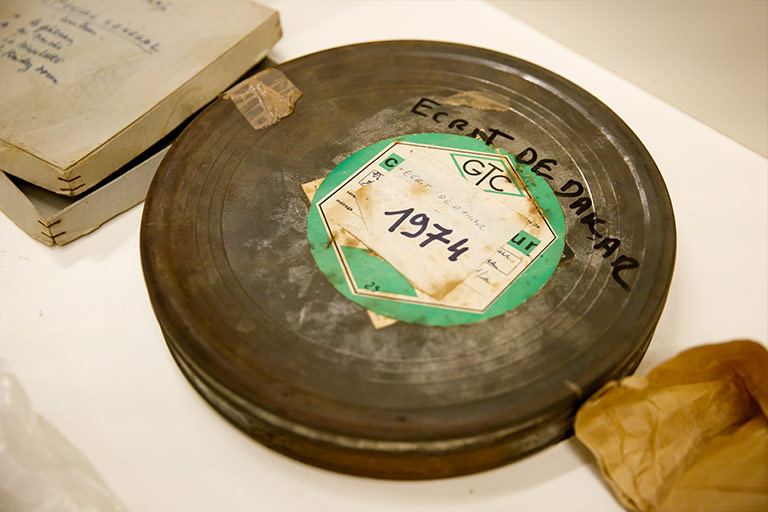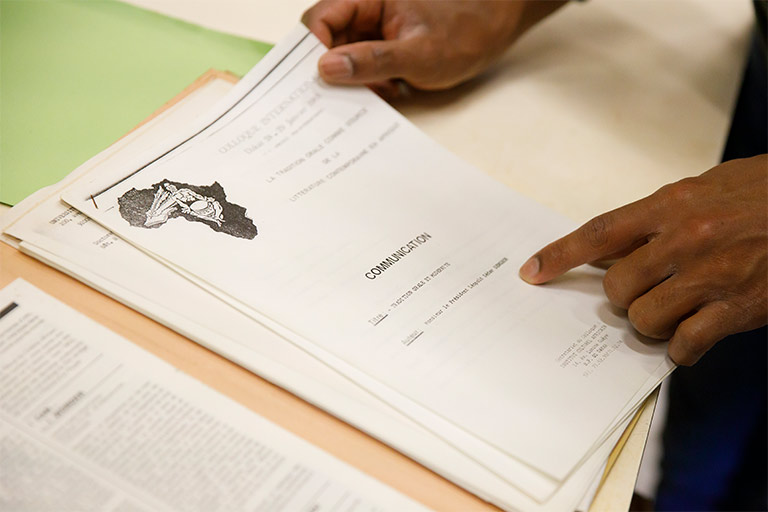Extent
Acquired 2021
- ~50 Linear Feet
Acquired 2021
Paulin S. Vieyra (January 31, 1925 – November 4, 1987) was a filmmaker, producer, and scholar whose career is central to West African film history. His great-grandfather was a member of a Bida royal family in Nigeria who was sent to Brazil as a slave. In 1835, after his emancipation following the slave rebellion in Bahia, Vieyra’s great-grandfather settled in the former Portuguese slave port of Porto Novo (New Port), Benin, with his wife and the Portuguese last name Vieyra, derived from his former Brazilian slave master. Paulin S. Vieyra’s father was a Yoruba railroad administrator and his mother, a merchant. In 1935, when he was ten years old, Vieyra’s parents sent him to France to attend boarding school. In 1954, he graduated from the Institute for Advanced Cinematographic Studies, or IDHEC (now known as La Fémis) with a thesis on cinema in French-speaking Africa. He was the first African admitted to study at IDHEC. In 1955, Vieyra directed the first substantial film by a French-speaking sub-Saharan African, Afrique sur Seine. This 21-minute, 16mm black-and-white fiction film featuring Marpessa Dawn, star of Black Orpheus (1959), and was produced by the French Ministry of Cooperation, co-directed by Jacques Melo Kane and Mamadou Sarr, and shot by Robert Caristan. Vieyra, Kane, Sarr, and Caristan would go on to be known as “Le Groupe Africain de Cinema” (The African Cinema Group).
In the late 1950s, Vieyra returned to Dakar, Senegal, where he would stay through the 1960s. Léopold Sédar Senghor, the first president of independent Senegal, appointed Vieyra as the first director of the Senegalese Office for Radio Broadcasting and Television and the Sciences and Information Technology Research Centre. In this role, he was tasked with organizing the media office in charge of news production, educational movie screenings, and state funding of film production and education. His position was critical because, under colonialism, many European powers perceived cinema as a threat, leading them to impose strict limits on the production and distribution of African films, such as the Laval Decree of 1934. In the process of decolonization, Vieyra worked to reclaim and nurture African cinema through his governmental role, his personal filmmaking, and his doctoral work, as well as his support of other African filmmakers and of African film in general.
Vieyra went on to serve as a mentor and production manager for Senegalese filmmakers, including Ousmane Sembène and Ababacar Samb Makaram. He organized equipment and personnel for Sembène’s Borom Sarret (1963) and produced Le Mandat (1968), Taaw (1970), Xala (1974), and Ceddo (1977). He also wrote Sembène into film history with the publications Ousmane Sembène, cineaste: première période, 1962-1971 (1972) and Le cinema au Sénégal (1983). Additionally, he often collaborated with the notable cultural magazine and publisher Présence Africaine and in 1975, he published one of the first histories of African cinema, Le cinema africain, des origins à 1973. He was also a founding member of the Pan-African Federation of Filmmakers (FESPACI) and the Pan-African Film Festival (FESPACO), two institutions with an enduring impact to this day. In 1982, he received his doctorate from Université de Paris, under the direction of Jean Rouch.
The Paulin S. Vieyra collection includes Vieyra’s personal papers, correspondence, publications, photographs, films, and personal artifacts among other materials. Highlights from the collection include Vieyra’s personal typewriter, camera, and projectors, as well as notes from his time as a student at IDHEC, numerous interviews with other African filmmakers, documents concerning his work with Senegalese government cultural institutions, documents concerning his work with FESPACI and FESPACO, numerous unpublished manuscripts and screenplays, and copies of several of Vieyra’s films.


The Media School
Black Film Center & ArchiveHours: Monday -Friday, 9 am - 12 pm, 1pm - 4.30 pm